- Home
- Brian Keene
The Conqueror Worms Page 12
The Conqueror Worms Read online
Page 12
Jimmy did three years at Cresson State up in Pennsylvania. Thanks to overcrowding, they let him out on parole. While he was gone, Becky and the baby ran off with some Lexus-driving yo-boy she met at a club. Secretly, I was relieved. But it still hurts sometimes, knowing there’s a kid out there somewhere who looks like me.
Well—probably not anymore.
We had a welcome-home party, and Jimmy readjusted to civilian life. He landed a job at the casket factory. Things were good. We chilled, marveling over the fact that our five-year high school reunion was coming up.
Then the rain started, washing it all away.
I wouldn’t cry. I wanted to, but I couldn’t. There were many times since the rain started that I’d wanted to cry, especially now. I felt like screaming, ranting at the gray haze that had replaced the once blue sky. I wanted to collapse, cradling my best friend’s head, and just stay there, not moving or thinking ever again.
I couldn’t cry because I’m incapable of it. Sure, when I was a little kid, I cried when I skinned my knee or didn’t get my way. But I’ve never been able to do it over death. I used to think there was something wrong with me. When I was twelve, my grandmother died. At the funeral, I couldn’t cry, and I felt like a complete dick. My parents were crying, my sister, my aunts and uncles—but not me. I just stood there with a stupid look on my face. Sure, I was sad. I grieved. I loved my grandma. But when the time came, the tears were absent and I couldn’t summon them, no matter how hard I tried.
I looked up at the sky, letting the rain beat against my face and pretended the drops of water were tears. They were phony tears, but it was the best that I could do.
Voices carried over the roaring waves. Ducking down so the Satanists wouldn’t see me, I quickly took stock. The Globe Capital building had been a complete bust (except for the jellyfish), but the Chesapeake Apartments had yielded a dozen bottles of spring water. It seemed obscene that with so much water falling from the sky, fresh water was like gold. But the rain had a high salt content, at least in our area. I’m not sure why. Don’t know if it was some freak ecological occurrence or what. We’d heard from passersby that it was better in other places. I’d also found some canned goods, a flashlight that still worked, a fifth of Jim Beam, a half empty bottle of vodka, two dry cartons of smokes (almost as valuable as the bottled water), a few paperbacks and magazines that hadn’t begun to mold yet, a box of crayons, and most importantly, a houseplant, a bag of potting soil, and three little envelopes of seeds—carrots, marigolds, and sunflowers.
And Jimmy’s head.
Sighing, I placed the loot inside one of the nylon backpacks I carried with me, so that it would all stay dry during the trip back home. Then I dropped the backpack into a garbage bag for extra insulation. Finally, I wrapped Jimmy’s head in a plastic bag and stuffed it inside the backpack as well. The pockets of my raincoat bulged with smaller items: cigarette lighters, waterproof matches, vitamins, silverware, toothpaste, aspirin and other medicines, pens, batteries, candles—anything I thought our group could use. The only thing I left behind was cash. That was good for starting fires, and then only if the bills were dry.
After I finished, I waited for the Satanists to leave. Starting the boat motor would have been like shouting, “Hey guys, here I am!” Paddling off the rooftop without the motor running would be futile because of the waves. They’d push me right back onto it.
I waited about an hour and eventually they moved on. I guess the surfing was better in another part of the city. When I was sure it was safe, I untied the boat from the flagpole and started home.
The blue-green ocean seemed huge and endless and lonely, and it was pretty quiet, except for the waves, the seagulls, and the rain hitting the water. I kept glancing around for signs of pursuit, but I was alone.
“Raindrops keep falling on my head,” I sang. “But that doesn’t mean my eyes will soon be turning red. Crying’s not for me, cause I’m never gonna stop the rain by complaining, because—”
My voice bounced back to me off the remains of a skyscraper, and I stopped singing. The echoes gave me goose bumps.
Debris floated by: wooden crates, aluminum lawn furniture, bodies and pieces of bodies. I tried to snag a few of the crates so that I could examine the contents, but the tide carried them out of my reach. We didn’t need the lawn furniture, and I already had Jimmy’s head, so I left the other body parts alone.
Water dripped from the oars, oily and slimy. I shuddered to think what was in it, all of the chemicals and pollution from the flooded buildings and industrial sites, and the bodies of the dead, of course.
To pass the time, I wondered about what the rest of the world was like now, if it was raining and flooded there, too. Occasionally, people sailed through Baltimore and stopped at our building, wanting to trade with us, or just looking for a dry place to dock and rest. When this happened, we’d hear news. Most of it concerned pockets of survivors like us, scattered across the country; but some of the things we heard were just plain weird.
The crew of a Coast Guard cutter reported that the population of Estes Park, Colorado, had resorted to cannibalism and human sacrifice. Some yuppie investment banker who had sailed all the way from Philadelphia swore he’d seen mermaids and that his friend made love to one and was never seen again. We traded him two cases of bottled water and some batteries for fishing tackle and a handgun with extra ammunition, and then quickly sent him on his way. Dude was obviously crazy.
Two folks named Ralph and Holly arrived in a traffic chopper, and stayed with us for a week, while we treated Holly for an infected dog bite on her leg. They said that giant carnivorous earthworms were rampaging through most of the Appalachians. Supposedly, the creatures killed some friends of theirs in North Carolina. At the time, I didn’t believe them. But the kids believed them, and after they left, we went through a week of little Danielle waking up every night screaming about giant worms coming to eat her. Old Salty believed them, too, but Salty believed in everything.
I’d seen Salty around before the rains came. I don’t know what he did before he was homeless, but at one time in his life he’d been a sailor. When I first encountered him, he was a regular fixture at Baltimore’s Inner Harbor, telling sea stories for pocket change and watching the boats sail in and out. We used to give him money on Friday nights while barhopping in Fell’s Point.
Salty was a walking encyclopedia of nautical myths and superstitions and he never missed a chance to warn you of them. Bananas onboard a boat guaranteed you’d catch no fish. If you overturned a basin of water at home, disaster would follow at sea. It was unlucky for fishermen to count the contents of the first net hauled up for the day. When you stepped onboard a ship, you should always go with your right foot first. If the ship’s captain tripped while coming down a ladder, it was some bad mojo. Stuff like that. When one of the other girls offered to trim Sarah’s hair for her, Salty begged them not to. According to him, cutting your hair while the sea was calm would raise a storm. We pointed out that the sea hadn’t been calm for months and that it didn’t look like the storm would stop anytime soon.
So we had Salty, Sarah, and little Danielle (who we found clinging to the roof of a car, her family dead and bloated inside, gnawed on by the fish). There were two other kids—ten-year-old James and eight-year-old Malik. There was also Lee, a paunchy, balding schoolteacher from Texas. He’d been in Baltimore for his mother’s funeral and got stranded when the government halted all airline and rail service. The same thing happened to Mike, a middle-aged nuclear engineer from Idaho visiting Baltimore for a convention. Anna was a widow in her late-sixties, plump and matronly. Louis was sort of a beatnik. Always wore a beret. He’d owned a music store down in Fells Point, and his life partner, Christian, ran some kind of investment Web site. Nate was an architect, pompous and arrogant. Thought he was better than the rest of us. Juan was a Baltimore city cop. Hard as nails, but a nice enough guy. And smart. Then we had Taz, Ducky, and Lashawn. Taz had been a drug dealer and s
o was Ducky (I often wondered if those were their real names or just their street names, but I never found out). Taz was a big, hulking guy, built like a linebacker. Ducky was the exact opposite, thin and scrawny. Lashawn was Taz’s girlfriend, and while I don’t think he knew that she was also sleeping with Ducky, the rest of us did. We had two other women. Mindy had worked for an office supply company. She was smart and funny. Lori was about my age, and had gone to Johns Hopkins University. I’d had a crush on her and Mindy both—and Sarah, too, until I found out that she only dug other women. Finally, there’d been Jimmy and myself, the two amigos, reduced now to just one.
That was our group—all eighteen of us. There’d been more at one time. Some people left, sailing off in search of dryer pastures, and we never heard from them again. Cholera and typhoid were bad in the early days, before the dead were all washed out to sea. Two people died of heart attacks, and another from what we think was probably diabetes. One guy named Hector died from an impacted wisdom tooth infection. Amazing how something so minor can have such dire consequences without access to even basic medicine. A simple wisdom tooth cost Hector his life. The others who died succumbed to pneumonia, the White Fuzz, or else they drowned or simply vanished. We suspected that a few of these last ones probably fell victim to the Satanists.
Our neighbors weren’t real Satanists, of course. Real Satanists didn’t kill people or have orgies and black masses. I once dated a girl who was into Satanism, and I knew that real Satanism was a philosophy that was atheistic in nature. Satanists believed they were their own gods and that they controlled their own destiny. They didn’t actually believe in the Devil, but used Satan symbolically, to represent the opposite of Christ. Cool concept, but it wasn’t for me. I’d had a strict Methodist upbringing, and though I considered myself an agnostic, there were still enough of the oldschool teachings ingrained in me. I dumped both the girl and her philosophy after two weeks.
Anyway, our neighbors weren’t real Satanists, but that’s what Juan started calling them. Then Taz and Ducky started using it. After a while, the name stuck.
Like I said, real Satanists didn’t kill people, or have orgies and black masses—but these fuckers did just about every night. In the beginning, Juan and a few of the others suggested we take them out—do unto them before they could do unto us. But they had the numbers and an attack would have been suicide. They were bad news, so we just tried to avoid them as much as possible.
We had set up shop in the ruins of the big Marriott Hotel in what used to be the Inner Harbor district. Many upper floors of the city’s skyscrapers were still above water, but most of the buildings were flooded inside. Miraculously, ours wasn’t one of them. Somehow, the hotel had escaped any broken windows or cracks in the walls. The bottom floors were underwater, but from fifteen to twenty, everything was relatively dry. We lived on the top two floors.
The Satanists lived downtown in what was left of the Baltimore Trade Center. I’m guessing that, like our building, it had escaped major damage. I don’t know how many of them there were, but while our numbers were shrinking, theirs seemed to be growing. They had enough people that they could afford to sacrifice someone every evening, at least.
We’d watched them from the rooftop a few times, through a telescope that Lee found in one of the hotel rooms, but none of us had the stomach to keep spying for long.
Not after what we saw.
The fire was the first indication that something wasn’t right with our neighbors. With no streetlights or electricity, the Trade Center was barely noticeable at night. Until they lit the bonfire, that is.
The rain never stops. Sure, it changes. It has patterns. Mist to downpour, gentle breeze to gale force winds. But it never stops. Still, every night, despite the rain and the winds, the Satanists lit a huge bonfire on their roof, right in the middle of the helicopter pad. You could see it with the naked eye, a small, orange pinprick in the dark. But when we looked through the telescope…
It was bad. Water-soaked wood that shouldn’t have been able to burn did so anyway. The rain didn’t put the fire out. Once it was going, they tied people to posts and roasted them alive. Others had their throats cut or were weighted down with cement blocks and then tossed over the side—sacrifices to whatever deepsea denizens the Satanists worshipped.
One night, Juan, Christian, Jimmy, and I took a boat out to investigate. It was against my better judgment and in hindsight a really stupid thing to do, but we had to know more. We got close enough to hear them chanting. The words weren’t English. Hell, I’m not even sure they were in a language. It was like something out of a cheesy horror movie and it freaked us out pretty bad, so we left.
The Satanists weren’t our only neighbors. There were other survivors scattered throughout the city, but they were loners or madmen and kept mostly to themselves. I’m sure some of them ended up captured and sacrificed in the rituals.
Early on, the Satanists tried to raid our building twice, but we’d repelled both attacks, and they took some heavy casualties. Since then, they’d left us alone, but we still kept a guard posted on the roof twenty-four hours a day. We weren’t stupid enough to believe they wouldn’t eventually return.
I kept a wary eye out for them while I paddled over the submerged highrises and office buildings, but the Satanists had vanished. The only living creatures I saw were a school of dolphins frolicking over the space where Camden Yards used to be, and flocks of seabirds soaring far overhead.
When I returned to the hotel, Jimmy’s head still securely tucked away in the backpack, it was Lee and Mike’s turn on watch. I saw them through the downpour, water dripping from their plastic-covered rifle barrels. I tossed them the rope and Lee tied me off.
“Jimmy’s not back yet,” he said, sounding scared. “And it’s getting late.”
I took a deep breath.
“What’s wrong, Kevin?” Mike asked.
I exhaled. “He’s not coming back.”
“What do you mean? What the hell happened out there?”
“Get everybody together and I’ll tell you. I don’t want to rehash it over and over. It…it hurts too bad.”
Like a Viking returning home, I grabbed the plunder and walked inside.
Mike and Lee called after me, but I couldn’t hear what they said. Their words were lost in the rain.
I still wanted to cry. I still couldn’t.
So I let the sky do it for me instead.
Each floor of the hotel had a small lobby located next to the elevator doors. We’d turned the lobby on nineteen into a common area. While I hung up my wet clothing and toweled off, Mike and Lee gathered the others together. When I came out, they were all waiting for me, lounging on the couches and chairs.
“Bring us back anything good?” Mindy asked.
I nodded. “Always do, don’t I?”
I gave the paperbacks to Lee, Christian, Mindy, Sarah, and Lori, since they were the readers in the group. Louis, Taz, Ducky, Lashawn, Juan, and Salty divided up the cigarettes. Nate got the flashlight since he didn’t have one in his room and had been relying on candles. The Jim Beam and vodka were passed around and practically everybody took a swig except for the kids and Mike. He said that he’d managed to stay sober and on the wagon for ten years, and would be damned if the weather was going to make him start again. Sarah and Anna did most of our cooking, so the food went to them for safekeeping. Finally, I gave the crayons to the kids, and the grins on their faces cheered me up momentarily—until I felt the bulge of Jimmy’s head, still inside the bag.
“I wish you could find some jazz or blues discs, Kevin,” Louis said. “All we’ve got around here is hiphop and classic rock.”
“That reminds me,” Lee chimed in, “we need more D batteries, too, if you find any. The boom box runs on them.”
“I could use some more vitamins,” Christian said.
“Fuck that, playa.” Ducky grinned. “What we need is some chronic.”
“Chronic?” Nate looked puzzled. “W
hat’s that?”
“It’s street slang for weed,” Juan said, “and under the circumstances, it wouldn’t be a bad thing. Can’t believe I’m saying that.” He shook his head wistfully.
“All of you can fill out a shopping list,” I muttered, and sat down. “I’ll pick it up on my next trip outside.”
Lori handed me a warm can of soda and I sipped it gratefully. The carbonation soothed my upset stomach.
“So where’s Jimmy?” Mike asked.
I glanced at the kids.
Anna took the hint and herded them out of the lobby. “Come on, children. Let’s go color some pictures for everybody with those new crayons!” Anna had lost her family, including two grandchildren, and Danielle, James, and Malik had adopted her as their grandmother.
After they were gone, I cleared my throat. Everyone looked at me, waiting patiently. I guess they already suspected what I was going to say.
“Jimmy’s dead. I found him while I was on the supply run.”
They were silent, and then Juan spoke, saying aloud what they were all thinking. “The fucking Satanists.”
“I guess so. Who else could it be?”
“Where is he now?”
“In my bag. There’s not much left. He was…decapitated.”
They stirred.
“Show us.” Again, he wasn’t asking.
“I don’t want to see that,” Sarah protested. “Isn’t it bad enough—”
“Show us, Kevin.”
I paused, choosing my words carefully. I felt tired, and all I wanted to do was sleep. “Juan, where’s the sense in doing that? I mean, what, you don’t fucking believe me?”
Juan held out his hands. “Calm down, man. Of course I believe you.”
“Then why do you need to see his head?”
“Because I want to remember it for every one of those cultist motherfuckers that I put a bullet through. I want the image burned into all of our brains.”
“Word,” Taz seconded, and then turned to me. “You don’t seem that upset, dawg. I thought you two was homeboys and shit.”

 The Rising
The Rising Entombed
Entombed Take the Long Way Home
Take the Long Way Home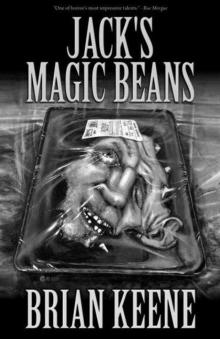 Jacks Magic Beans
Jacks Magic Beans Ghost Walk
Ghost Walk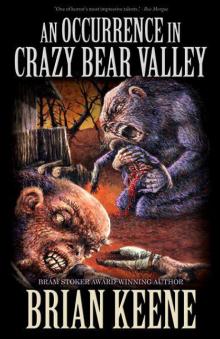 An Occurrence in Crazy Bear Valley
An Occurrence in Crazy Bear Valley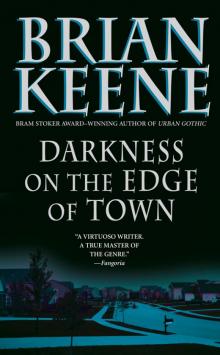 Darkness on the Edge of Town
Darkness on the Edge of Town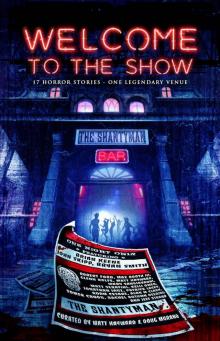 Welcome to the Show: 17 Horror Stories – One Legendary Venue
Welcome to the Show: 17 Horror Stories – One Legendary Venue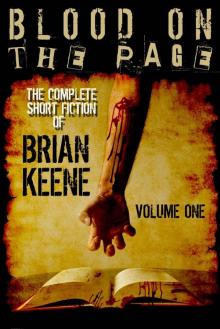 Blood on the Page: The Complete Short Fiction of Brian Keene, Volume 1
Blood on the Page: The Complete Short Fiction of Brian Keene, Volume 1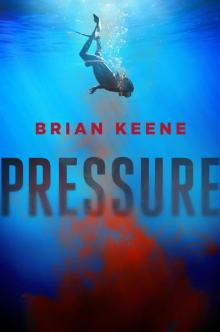 Pressure
Pressure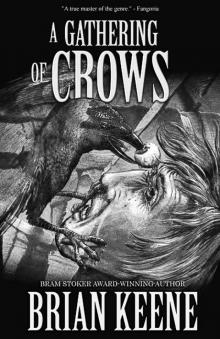 A Gathering of Crows
A Gathering of Crows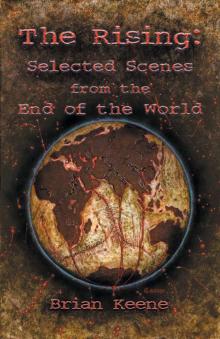 The Rising: Selected Scenes From the End of the World
The Rising: Selected Scenes From the End of the World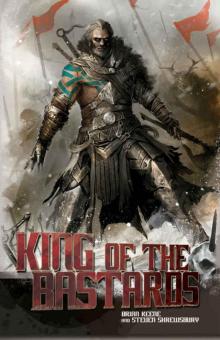 King of the Bastards
King of the Bastards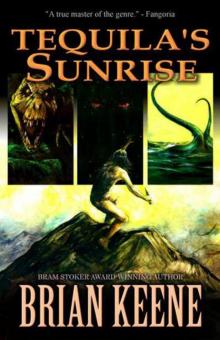 Tequila's Sunrise
Tequila's Sunrise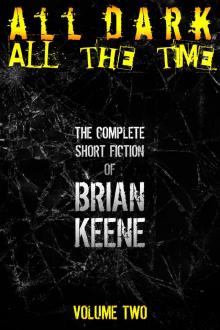 All Dark, All the Time
All Dark, All the Time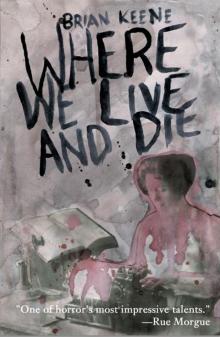 Where We Live and Die
Where We Live and Die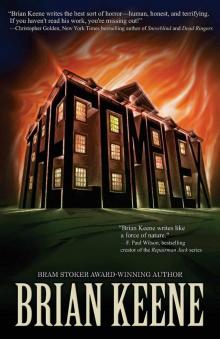 The Complex
The Complex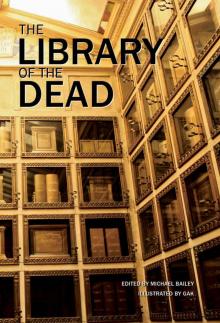 The Library of the Dead
The Library of the Dead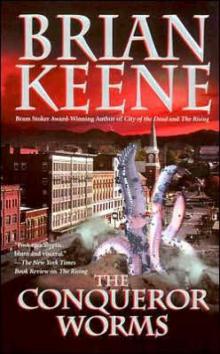 The Conqueror Worms
The Conqueror Worms The Girl on the Glider
The Girl on the Glider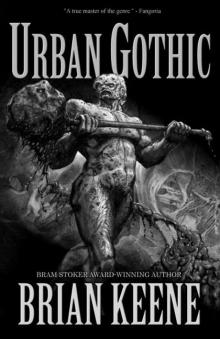 Urban Gothic
Urban Gothic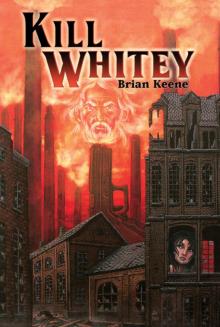 Kill Whitey
Kill Whitey Terminal
Terminal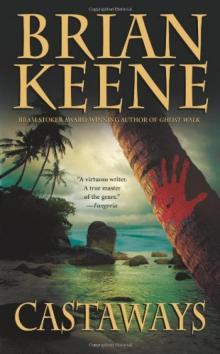 Castaways
Castaways